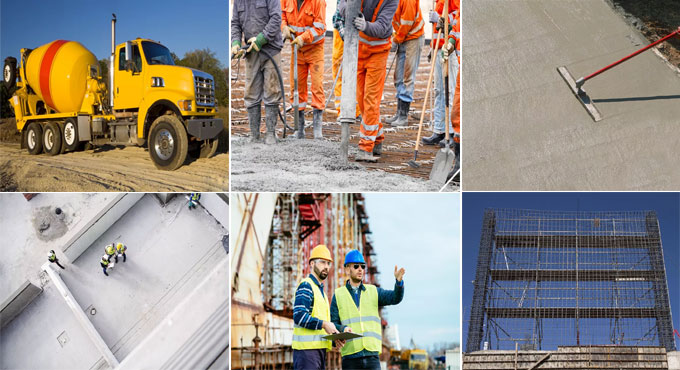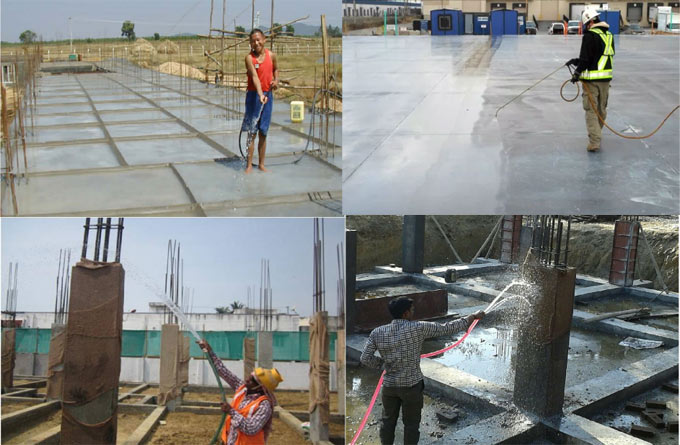Besides, considering the price of concrete per yard (or meter), cost calculation of new concrete includes other items like surface prep, formwork, reinforcing materials, and finish work, as well as the cost of the ready-mix concrete, that will be included to the total price of the concrete work. The Costs for specific items differ location wise or from site to site, but an approximate estimate can be prepared with some average amounts.
Cost Per Yard of Ready-Mix Concrete
The most vital item refers to the price of concrete, whether ready-mix concrete or other concrete material are utilized. Local ready-mix concrete suppliers can provide you the quotes based on the project specifications and the job location. Concrete pricing is generally stated per cubic yard or cubic meter (metre). For an average estimating purpose, utilize $77 per cubic yard.
Cost of Concrete Sub-Grade Work
When the concrete is set over soil, it is required to grade or make the surface ready for the concrete. Pricing for this includes the expenses associated with grading, compacting soil, excavating, trenching, and other components. As a good average, it is recommended to utilize $65 per hour of work required to set up the surface, supposing that the surface is leveled over 75 percent and no special work is necessary to make the site ready.
Costs for Extra Sub-Grade or Site Work
If the surface is unleveled, it is required to incur expenses for additional site work like excavating and filling with proper material or eliminating a soft spot on the terrain to prepare it for resisting structural loads. Based on the distance from where the sand will be arranged or any other proper fill material, it could put in over $10 per cubic yard or meter to your estimate. Another cost may incur for polyurethane plastic or vapor barrier essential to be set up prior to concrete placement.
Cost of Concrete Formwork
Developing concrete forms generally indicate a vital part of the total cost of concrete work, since it is one of the most time-consuming tasks of the job. It is required to recognize the type of formwork to be utilized as well as how it will be set up, and whether the form materials will be purchased or rented. Other related costs may contain a crane or other equipments which are applied to shift the form materials, form release product, re-processing form materials, and the cost to repair forms after various applications.
On average, formwork costs at $1.10 per square foot of the concrete area. It is calculated for a square or rectangular area. The cost is increased for concrete, if the formwork is rounded or contoured.
Cost to Finish Concrete
Concrete prices change considerably based on the type of finishing stated in the design. Concrete is finished several ways like smooth surface, exposed aggregate surface, or stamped concrete finish. Some surfaces may need only a strike-off and screed to perfect contour and elevation, whereas for others surfaces, a broomed, floated, or troweled finish should be specified. To calculate the finishing in your concrete pricing analysis, add $0.75 per square foot or perhaps more, based on the intricacy of the specified finish. The cost of any curing compound or testing services required should also be considered.
Cost of Concrete Reinforcement
Most concrete comprises of some type of reinforcement, like rebar, wire mesh, plastic mesh, or fiber which are included to the concrete mix to make the strength and crack-resistance better. Standard reinforcing materials can include roughly $0.18 cents per square foot. This number is greater for large-diameter rebar or other special reinforcement.

Read more
~~~~~~~~~~~~~~~~~~~~~~~~
Published By
Rajib Dey
www.constructioncost.co
~~~~~~~~~~~~~~~~~~~~~~~~
Cost Per Yard of Ready-Mix Concrete
The most vital item refers to the price of concrete, whether ready-mix concrete or other concrete material are utilized. Local ready-mix concrete suppliers can provide you the quotes based on the project specifications and the job location. Concrete pricing is generally stated per cubic yard or cubic meter (metre). For an average estimating purpose, utilize $77 per cubic yard.
Cost of Concrete Sub-Grade Work
When the concrete is set over soil, it is required to grade or make the surface ready for the concrete. Pricing for this includes the expenses associated with grading, compacting soil, excavating, trenching, and other components. As a good average, it is recommended to utilize $65 per hour of work required to set up the surface, supposing that the surface is leveled over 75 percent and no special work is necessary to make the site ready.
Costs for Extra Sub-Grade or Site Work
If the surface is unleveled, it is required to incur expenses for additional site work like excavating and filling with proper material or eliminating a soft spot on the terrain to prepare it for resisting structural loads. Based on the distance from where the sand will be arranged or any other proper fill material, it could put in over $10 per cubic yard or meter to your estimate. Another cost may incur for polyurethane plastic or vapor barrier essential to be set up prior to concrete placement.
Cost of Concrete Formwork
Developing concrete forms generally indicate a vital part of the total cost of concrete work, since it is one of the most time-consuming tasks of the job. It is required to recognize the type of formwork to be utilized as well as how it will be set up, and whether the form materials will be purchased or rented. Other related costs may contain a crane or other equipments which are applied to shift the form materials, form release product, re-processing form materials, and the cost to repair forms after various applications.
On average, formwork costs at $1.10 per square foot of the concrete area. It is calculated for a square or rectangular area. The cost is increased for concrete, if the formwork is rounded or contoured.
Cost to Finish Concrete
Concrete prices change considerably based on the type of finishing stated in the design. Concrete is finished several ways like smooth surface, exposed aggregate surface, or stamped concrete finish. Some surfaces may need only a strike-off and screed to perfect contour and elevation, whereas for others surfaces, a broomed, floated, or troweled finish should be specified. To calculate the finishing in your concrete pricing analysis, add $0.75 per square foot or perhaps more, based on the intricacy of the specified finish. The cost of any curing compound or testing services required should also be considered.
Cost of Concrete Reinforcement
Most concrete comprises of some type of reinforcement, like rebar, wire mesh, plastic mesh, or fiber which are included to the concrete mix to make the strength and crack-resistance better. Standard reinforcing materials can include roughly $0.18 cents per square foot. This number is greater for large-diameter rebar or other special reinforcement.

Read more
~~~~~~~~~~~~~~~~~~~~~~~~
Published By
Rajib Dey
www.constructioncost.co
~~~~~~~~~~~~~~~~~~~~~~~~
